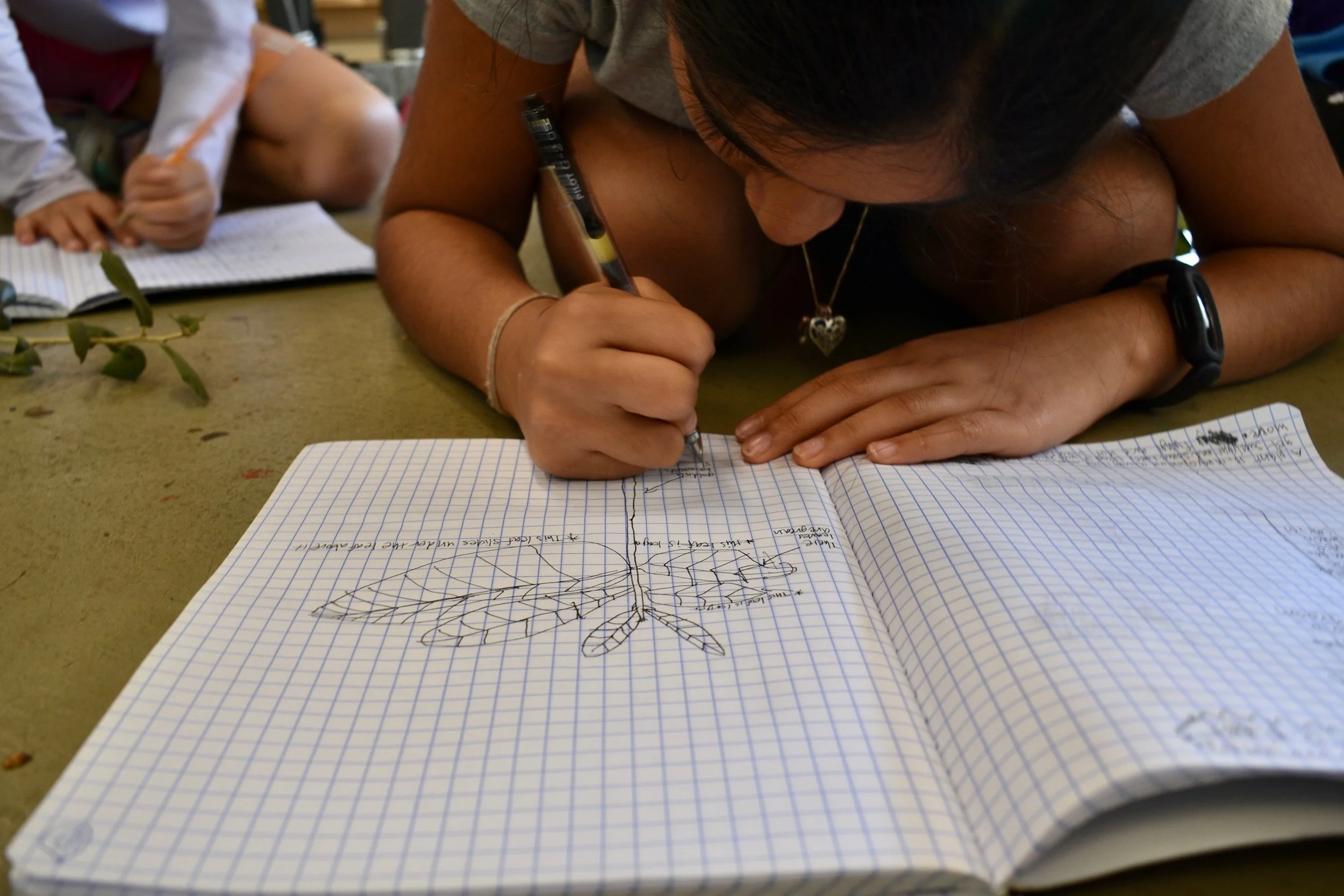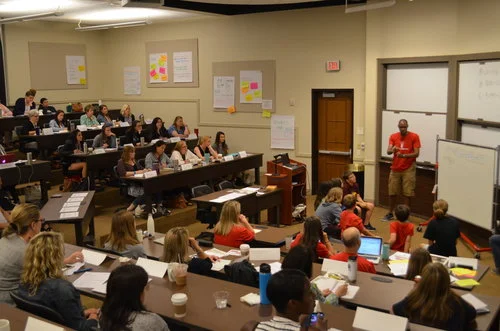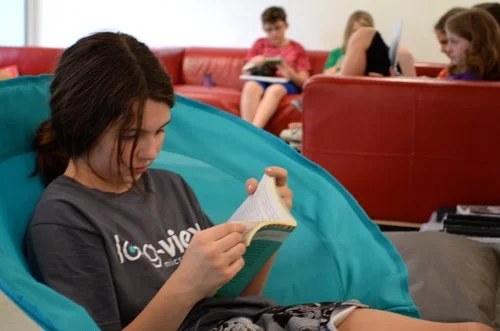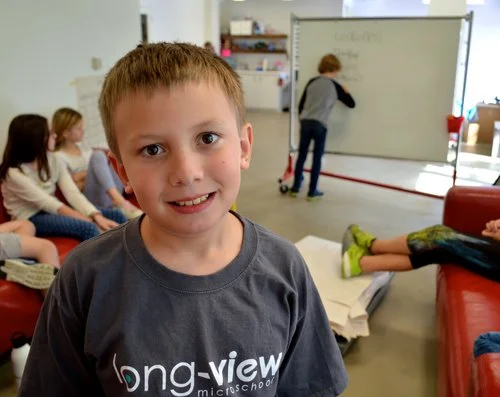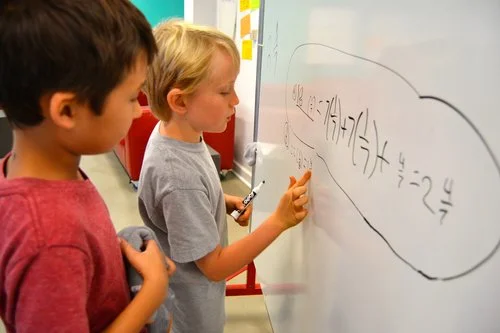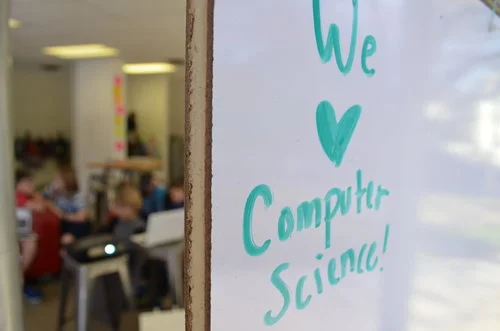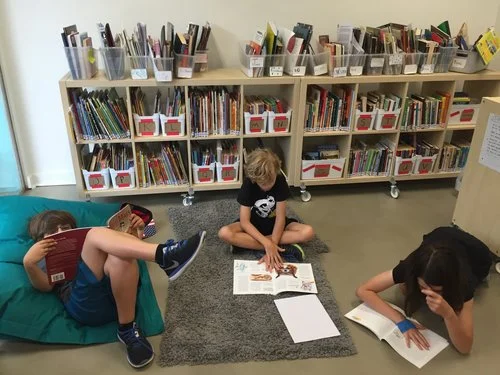Long-View + the number lab: Our Business Model
It’s quiet at Long-View with the kids out for summer break, but it is actually a time of intense activity for our teaching team. This is the busiest part of the year for our other business venture, the number lab, which is concentrated on supporting educators and schools working to raise the level of their math instruction. Our work:
focuses on the task of building math instruction so as to privilege advanced conceptual mathematical understanding in order to facilitate reasoning;
focuses on attempts to design innovative classroom practices that bring the practice of knowing mathematics in school closer to what it means to know mathematics within the discipline.
Read More
How Our Micro-School is Talking To Parents -- All Day Long
Take a look at the article published on The National Association of Independent Schools' Website today!
Click here.
Read More
Build Week #4 Makes a Splash
Our fourth Build Week of the 2017-18 school year might have ended up the richest week of learning we’ve ever experienced! As the kids walked in on Monday of this last Build Week, Ms. Bayer was watching the same videos we watched in Science last week – those of Nate Ball on Nova’s “The Secret Life of Scientists and Engineers” series. This MIT-trained mechanical engineer simultaneously names himself a “daredevil” and an engineer, and he has great videos on how these two identities intertwine. Most famously, these qualities worked in tandem to support Nate’s invention of the Atlas Powered Ascender, which helps military personnel get out of precarious situations in the way batman might. Just as Campfire was about to begin, Ms. Bayer got the crazy idea to attempt to contact Nate Ball on Google Hangout. Even thought Nate lives in Boston and wasn’t expecting us, he answered! Nate told us he has heard of Long-View and when he realized it was our last Build Week of the year, he threw out a BIG engineering challenge for us....
Read More
Why School Schedules Don't Work
I’ve never met a parent who didn’t have high expectations for his or her child’s school.
First, we expect that school will prepare our children for whatever the next step is. If they’re in first grade, they’ll end the year ready for second grade, and so on through college, employment, and successful adult life.
We expect schools to provide age-appropriate physical education, plus a grounding in the arts, music, and a foreign language.
We also expect that school will help our children learn how to navigate social situations like cliques or favoritism. We hope that our children’s schools will help them become good people.
And we hope our child will fall in love with learning at school…
Read More
Build Week#3: Cold Case #T8523-15 Solved!
An incredibly high-level and high-energy week just concluded at Long-View: Build Week #3 brought together work on chemistry, argument, forensics, logic, collaboration, and critical thinking, with a hint of mystery mixed in.
Build Weeks are a part of the rhythm of the yearly calendar at Long-View, opening our schedule up to allow us to dive into special activities and challenges. Build Weeks help us grow intellectually, help us make connections between disciplines, give us a chance to break the “routine” of school life, and give us an opportunity to try new things.
Build Week #3 also gave us the chance to meet new people. The week began with crime scene tape surrounding one classroom door and Detective Julie Long of the Austin Police Department showing up with a locked briefcase....
Read More
Watch Your (Mathematics) Language!
If you step into a Long-View mathematics class, you’re apt to hear students reading mathematics expressions using language that seems a little different.
In reading an addition expression such as 41 + 17, for example, you’d hear a Long-View student say “forty-one and seventeen” rather than “forty-one plus seventeen.” While this may seem like a subtle substitution, there is a great deal of deliberate thought underneath this use of language that supports our young mathematicians as they develop strong conceptual understandings that will transfer across all of arithmetic to Algebra. Language is actually one of the most under-utilized models in school mathematics. Not at Long-View....
Read More
What Makes Long-View Different?
With admissions season gearing up, we are interacting daily with many parents carefully thinking about which school will be best for their children, for their family. We find that a great starting point is to get to know what makes a school unique.
Long-View is very purposefully designed differently than other area schools. We aren't trying to check the box of being all things to all families. We aren't trying to impress you with a huge facility or a list of course offerings that trumps the next school. You won't see any worksheets at Long-View and we don't assign homework.
Long-View is a great fit for families who want a rigorous academic program but are seeking a school that thinks differently about learning. We value depth over breadth...
Read More
Scientific Inquiry Soars to New Heights
What does it mean to be a scientist and to “do science”? Over the last months, our Long-View learners have worked to better understand that, as scientists, we are always asking -- and trying to answer --questions about the natural world.
There are four ways that scientists go about this…
Read More
Computer Science is Integral to a Strong Education
We teach all children to write, but we don’t expect them all to necessarily become writers. In a world in which computing is ubiquitous and drives innovation in nearly every industry, it is important that we teach our children from an early age how to harness what Jeannette Wing, Professor of Computer Science at Carnegie Mellon and VP of Microsoft Research, called “computational thinking.” Computer Science is the broad area in which much of this would be taught to children, and Computer Science is now foundational to a strong education, right alongside reading, mathematics, science, and writing....
Read More
Launching Into Information Text
We kicked off Information Text Units today in both Reading and Writing. We know that for many of the kids, these units will really propel them forward in their development. We are excited to see the learning and growth over the next weeks!
Traditionally, much of the elementary school curriculum has focused upon the reading of fiction, but extensive research has now established the importance of the literacy curriculum also focusing upon supporting children to be proficient in reading complex informational texts. Most of the required reading in college is informational in structure and challenging in content. Approximately 96% of the sites on the World Wide Web are…
Read More

